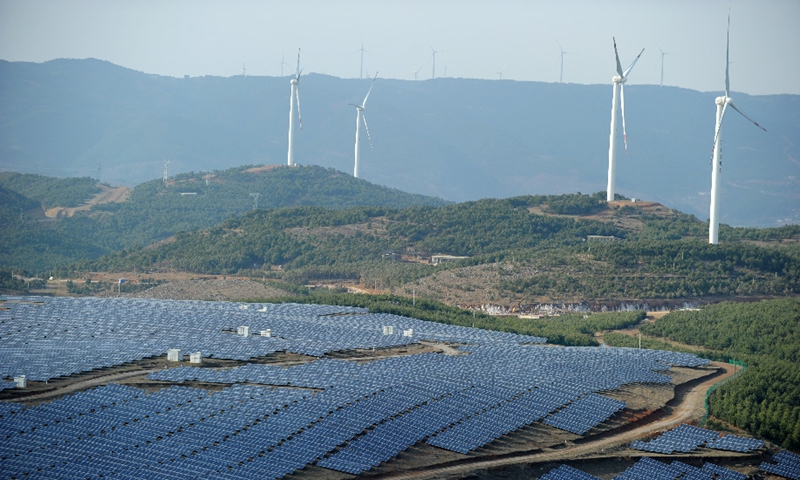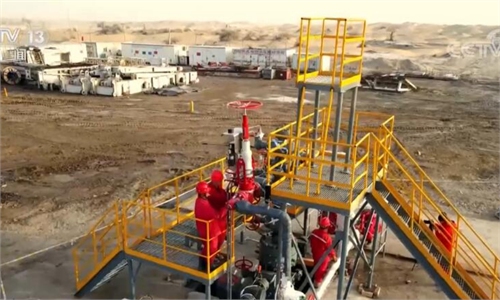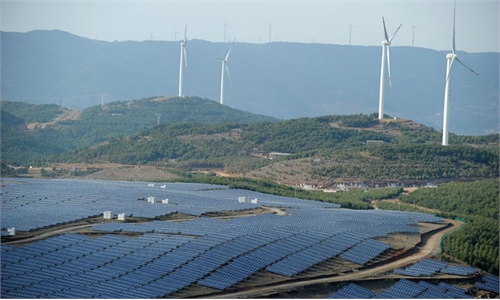China’s stronger ability to ensure energy, food security injects confidence to world
Nation won’t scale back opening-up efforts or even turn to a ‘self-sufficient economy’: official

Photo taken on March 13, 2018 shows the Pingjing photovoltaic power station and Dahaizi wind power station in Weining County, southwest China's Guizhou Province.Photo: Xinhua
Amid a global food and energy supply crunch caused by geopolitical confrontations, China has been improving its capability of ensuring domestic supply with higher annual output and stable market operations, contributing to the global energy and food security and injecting confidence to the world, officials and experts said on Monday.
"As a large producer and consumer of energy, ensuring energy security is always the priority of the country," Ren Jingdong, deputy director of the National Energy Administration and member of the administration's CPC leadership group, told a press conference on the sidelines of the ongoing 20th National Congress of the Communist Party of China on Monday.
China will strive to increase domestic fuel production and supply, aiming to bring annual domestic energy production capacity to more than 4.6 billion tons of standard coal by 2025, he said.

Photo:Li Hao/GT
Meanwhile, efforts will be made to construct fuel storage facilities, including accelerating construction of coal warehouses and liquefied natural gas terminals, to ensure reasonable resilience in energy supply, the official said.
In the first eight months of the year, the country's coal output rose 11 percent year-on-year to 2.93 billion tons, while crude oil production saw steady expansion during the past three years in a row, and the annual natural gas output increased by more than 10 billion cubic meters for five consecutive years, official data showed.
The government will give full play to the role of coal as a "ballast stone" with supportive role in maintaining domestic energy security, while enhancing oil and gas exploration and development, Ren said.
Ren said that China will also promote the development of clean energy, including wind power, solar power, hydropower and nuclear power, striving to make non-fossil fuels account for around 20 percent of China's total energy consumption by 2025 and around 25 percent by 2030.
The country will continue to strengthen the "bottom-line mentality" and risk awareness to improve energy security supervision and an early warning system, according to Ren.
China's capability in ensuring energy security has constantly improved over the past decade, with the country's energy self-sufficiency rate maintained at more than 80 percent, which helped it to withstand the tests of the COVID-19 pandemic, natural disasters and international energy market volatility, the official said.
"China's domestic energy stability will bring stability to the global energy market," Lin Boqiang, director of the China Center for Energy Economics Research at Xiamen University, told the Global Times on Monday.
While the coming winter will be a crucial challenge for countries like those in Europe, China's energy supply for winter heating is ensured, given the Chinese government's ramped-up efforts to increase coal production and market supply, Lin said.
China has sought to accelerate coal production capacity by 300 million tons in 2022 by approving higher production capacity, expanding output and putting new projects into operation.
At the same press conference, Cong Liang, head of the State Grain and Reserves Administration, said "With a sound food security situation, China has guaranteed that its food supply remains firmly in its own hands."
With only 9 percent of the world's arable land and 6 percent of the freshwater resources, China can feed around 20 percent of the global population, which itself is a great contribution to the world's grain security, experts said.
China has a large population of around 1.4 billion, and it would exert heavy pressure on global grain supply if China faced a food shortage. In this regard, China's national strategy of food security itself is the country's commitment to global grain security, experts noted.
The country has ample and time-sensitive tools to deal with a variety of challenges, such as increasingly frequent extreme climatic hazards, and therefore an overall harvest would be a sure thing for China's grain production this year, Li Guoxiang, a research fellow at the Rural Development Institute, Chinese Academy of Social Sciences, told the Global Times on Monday.


